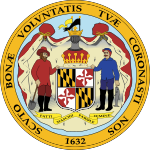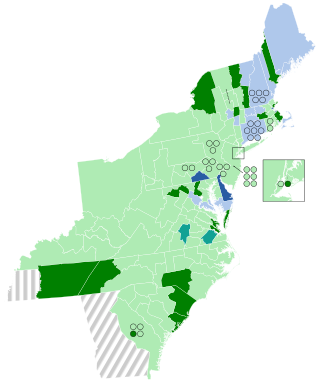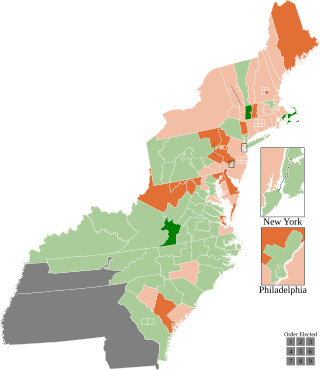A special election was held in Maryland's 3rd congressional district in 1816 to fill a vacancy left by the resignation of Alexander C. Hanson (F) upon being elected to the United States Senate.
| Elections in Maryland |
|---|
 |
A special election was held in Maryland's 3rd congressional district in 1816 to fill a vacancy left by the resignation of Alexander C. Hanson (F) upon being elected to the United States Senate.
| Candidate | Party | Votes [1] | Percent |
|---|---|---|---|
| George Peter | Federalist | 1,849 | 45.5% |
| Charles Kilgour | Federalist | 1,255 | 30.9% |
| Nicholas Snethen | Democratic-Republican | 954 | 23.5% |
George Peter was seated on December 2, 1816. [2]

The 1816 United States presidential election was the eighth quadrennial presidential election. It was held from November 1 to December 4, 1816. In the first election following the end of the War of 1812, Democratic-Republican candidate James Monroe defeated Federalist Rufus King. The election was the last in which the Federalist Party fielded a presidential candidate.
The 1820–21 United States House of Representatives elections were held on various dates in various states between July 3, 1820, and August 10, 1821. Each state set its own date for its elections to the House of Representatives before the first session of the 17th United States Congress convened on December 3, 1821. They coincided with President James Monroe winning reelection unopposed.
The 1816–17 United States House of Representatives elections were held on various dates in various states between April 30, 1816 and August 14, 1817. Each state set its own date for its elections to the House of Representatives before the first session of the 15th United States Congress convened on December 1, 1817. The size of the House increased to 184 after Indiana and Mississippi achieved statehood.

The 1804–05 United States House of Representatives elections were held on various dates in various states between April 24, 1804, and August 5, 1805. Each state set its own date for its elections to the House of Representatives before the first session of the 9th United States Congress convened on December 2, 1805. The elections occurred at the same time as President Thomas Jefferson's re-election. Elections were held for all 142 seats, representing 17 states.

The 1802–03 United States House of Representatives elections were held on various dates in various states between April 26, 1802 and December 14, 1803. Each state set its own date for its elections to the House of Representatives, either before or after the first session of the 8th United States Congress convened on October 17, 1803. They occurred during President Thomas Jefferson's first term in office.

The 1796–97 United States House of Representatives elections took place in the various states took place between August 12, 1796, and October 15, 1797. Each state set its own date for its elections to the House of Representatives. The size of the House increased to 106 seats after Tennessee became the 16th state to join the union. The first session of the 5th United States Congress was convened on May 15, 1797, at the proclamation of the new President of the United States, John Adams. Since Kentucky and Tennessee had not yet voted, they were unrepresented until the second session began on November 13, 1797.

The 1792–93 United States House of Representatives elections were held on various dates in various states between August 27, 1792, and September 6, 1793. Each state set its own date for its elections to the House of Representatives before the first session of the 3rd United States Congress convened on December 2, 1793. With the addition of the new state of Kentucky's representatives, and the congressional reapportionment based on the 1790 United States census, the size of the House increased to 105 seats.

Maryland's 3rd congressional district covers all of Howard county as well as parts of Anne Arundel and Carroll counties. The seat is currently represented by John Sarbanes, a Democrat.

The 1816–17 United States Senate elections were held on various dates in various states. As these U.S. Senate elections were prior to the ratification of the Seventeenth Amendment in 1913, senators were chosen by state legislatures. Senators were elected over a wide range of time throughout 1816 and 1817, and a seat may have been filled months late or remained vacant due to legislative deadlock. In these elections, terms were up for the senators in Class 2.

The 1814 United States House of Representatives elections in New York were held from April 26 to 28, 1814, to elect 27 U.S. Representatives to represent the State of New York in the United States House of Representatives of the 14th United States Congress.

The 1816 United States House of Representatives elections in New York were held from April 23 to 25, 1816, to elect 27 U.S. Representatives to represent the State of New York in the United States House of Representatives of the 15th United States Congress. At the same time, a vacancy was filled in the 14th United States Congress.

Maryland elected its members October 6, 1816.

On March 12, 1815, a few days after the legal start of the 14th Congress, but long before the first meeting of that Congress, David Bard (DR), who'd been re-elected to the 9th district, died. A special election was held on October 10 to fill the vacancy left by his death.

On October 8, 1816, a special election was held in Pennsylvania's 9th district, the second special election in that district in the 14th Congress. The reason for the special election was Thomas Burnside (DR)'s resignation to accept a judicial appointment in April of that year. Burnside himself had been elected to the seat in the previous special election.

On June 4, 1816, after being defeated for re-election, Enos T. Throop (DR) of New York's 20th district resigned his seat. A special election was held in September of that year to fill the vacancy left for the remainder of the 14th Congress

The 1816 special elections for Maryland's 5th congressional district were to fill two separate vacancies. The 5th district was a plural district, with two seats. Both seats were vacated, the first by Representative Nicholas R. Moore (DR) in 1815, before the 14th Congress even met, and the second by Rep. William Pinkney (DR) on April 18, 1816 after being named Minister to Russia.

On December 15, 1815, having been elected to the Senate, Nathaniel Macon (DR) of North Carolina's 6th district resigned. To fill the vacancy left in North Carolina's representation for the 14th Congress, a special election was held on January 22, 1816.

On April 16, 1816, Richard Stanford (DR) of North Carolina's 8th district died in office. A special election was held to fill the resulting vacancy

In April, 1816, John McLean (DR) of Ohio's 1st district resigned. A special election was called to fill the resulting vacancy.

In the 1816 elections in Pennsylvania, David Scott (DR) won one of the two seats in the 10th district, but resigned before the 15th Congress began, having been appointed judge of the court of common pleas. A special election was held on October 14, 1817 to fill the resulting vacancy.